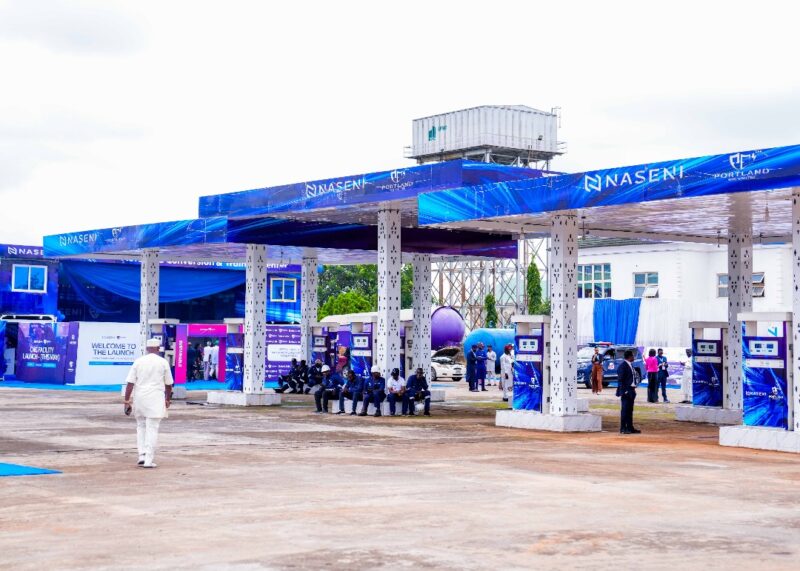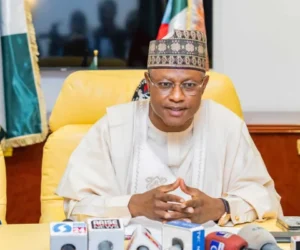Kubwa Expressway, in Abuja came alive on Wednesday, August 13, 2025, as top government officials, industry leaders, legislators and investors converged for the commissioning of the NASENI–Portland Limited Daughter Station; a facility that would transform energy and transportation landscape, especially, within Abuja and environs.
The commissioned project, by the National Agency for Science and Engineering Infrastructure (NASENI) and Portland Gas Limited, houses a Compressed Natural Gas (CNG) Conversion Centre, Training Academy, and Gas Refill Station. It is the second such CNG hub in the Federal Capital Territory after the flagship station in Utako, being perceived as a practical step towards delivering the Federal Government’s Renewed Hope Agenda on cleaner, cheaper and sustainable energy.
For NASENI’s Executive Vice Chairman/CEO, Khalil Suleiman Halilu, the goal is simple; to make CNG an everyday reality for Nigerians. “Did you know the average Nigerian driver spends over 40 percent of their daily earnings on fuel? That’s one of the highest burdens in the world,” Halilu said during the commissioning.
SPONSOR AD
He added that, “Now, imagine if we could cut that by half, while reducing harmful emissions and extending the life of our engines. That is the reality we are working towards.” The new daughter station can convert up to 20 vehicles daily from petrol or diesel to CNG, with trained manpower and infrastructure to sustain the shift.
Halilu said NASENI’s vision goes beyond facilities. “Over the past year, we have trained 300 Nigerian engineers from all geo-political zones in CNG conversion, auto maintenance, and clean energy technologies. They are the vanguard of this movement”, Halilu said.
NASENI plans to replicate such stations across 36 states and the FCT, making CNG “more accessible, affordable, and convenient for everyday Nigerians.”
For Halilu, the new station is not just a piece of infrastructure but a piece of a national puzzle. “This is about accessibility, bringing CNG technology closer to the people, breaking monopolies to improve service quality and affordability and reducing bottlenecks and long queues for users,” he explained.
The launch comes in the wake of Nigeria’s historic removal of fuel subsidies on 29th May 2023, a decision President Bola Ahmed Tinubu announced during his inaugural speech. The policy, while applauded by economists for removing a massive fiscal burden, triggered immediate hikes in petrol prices and transport fares, squeezing household incomes.
By that date, Nigeria had already spent ₦5.5 trillion on fuel subsidies in just five months, despite not budgeting for them. The National Assembly had outlawed subsidies under the 2021 Petroleum Industry Act, but payments persisted, draining resources from health, education and infrastructure.
Programme Director, Presidential Initiative on Compressed Natural Gas Initiative (PCNGi); Michael Oluwagbemi said the era of fuel subsidy is characterized to “importing poverty and exporting jobs” adding that “the CNG initiative is about using what we have to build what we need.”
With Nigeria sitting on 210 trillion cubic feet of natural gas, about a third of Africa’s reserves, the administration saw Compressed Natural Gas (CNG) as an immediate, lower-cost alternative to petrol and diesel. CNG-powered transport offers up to 80–90 per cent savings compared to petrol, with less harmful emissions and longer engine life.
The Speaker of the House of Representatives, Hon. Tajudeen Abbas, represented by Hon. Alex Mascot Ikwechegh, thanked NASENI for “making life easier for Nigerian citizens” through tangible energy transition projects. “Energy transitions are never just about technology, they are about the quality of life for our people,” Abbas said.
He cited examples of Argentina, Pakistan and Iran, where millions of vehicles now run on CNG. He urged Nigerians to embrace the shift, noting that it “will not happen overnight, but every conversion, every filling station, every trained technician brings us closer.”
From the executive branch, Chief of Staff to the President, Hon. Femi Gbajabiamila, represented by Special Adviser on Energy Olu Verheijen, called the NASENI–Portland partnership “a clear example of how the private sector plays a vital role in driving our nation’s economic growth and development.”
“Our role as government is to act as a catalyst, unlocking private sector expertise and capital to deliver meaningful results,” Verheijen said, adding that the pace set by NASENI should serve as a model for other agencies.
Industry veterans echoed this vision. President of the Virtual Gas Infrastructure Association of Nigeria and CEO of Total Support Energy Group, Mr. Ubani Nkaginineme, recalled building the first Nigerian CNG mother station in Port Harcourt in 2011. “Gas is not partisan, it is for the people,” he said. “I must commend this present government for taking the bold leap that brought us here today.”
The Director-General of National Automotive Design and Development Council (NADDC), Mr. Oluwemimo Joseph Osanipin, stressed that “everywhere we go, Nigerians ask; where is the gas?” He hailed NASENI and Portland for providing tangible answers, adding that “this is a movement, not just about powering vehicles, but industries and homes.”
Portland Gas Limited, NASENI’s partner in the Kubwa and Utako hubs, has positioned itself as pioneer in Nigeria’s auto gas market. Managing Director of Portland Gas Limited, Folajimi Mohammed said the company’s goal is “to make CNG the people’s choice for transport; affordable, available, and reliable.”
He thanked the Federal Government for support and said partnerships like NASENI’s would “change the economics of transport for ordinary Nigerians.”
Executive Secretary of the Association of Local Distributors of Gas, Adejo Ogiri, emphasized the role of private capital, saying, “we have witnessed many more commissioning this year alone of LNG plants, CNG model stations, retail points. This is about unlocking our immense gas potential.”
NASENI’s ambition extends beyond national borders. “We believe Nigeria’s energy transition can set a model for Africa, where collaboration, innovation, and shared purpose drive the next chapter of industrial growth,” Halilu said.
All things being equal, every Nigerian state will have CNG facilities within a few years, fleets will be increasingly gas-powered, and conversion skills will be commonplace. The ripple effects from reduced transport costs to cleaner urban air, could reshape the economy and set an example for African peers.








